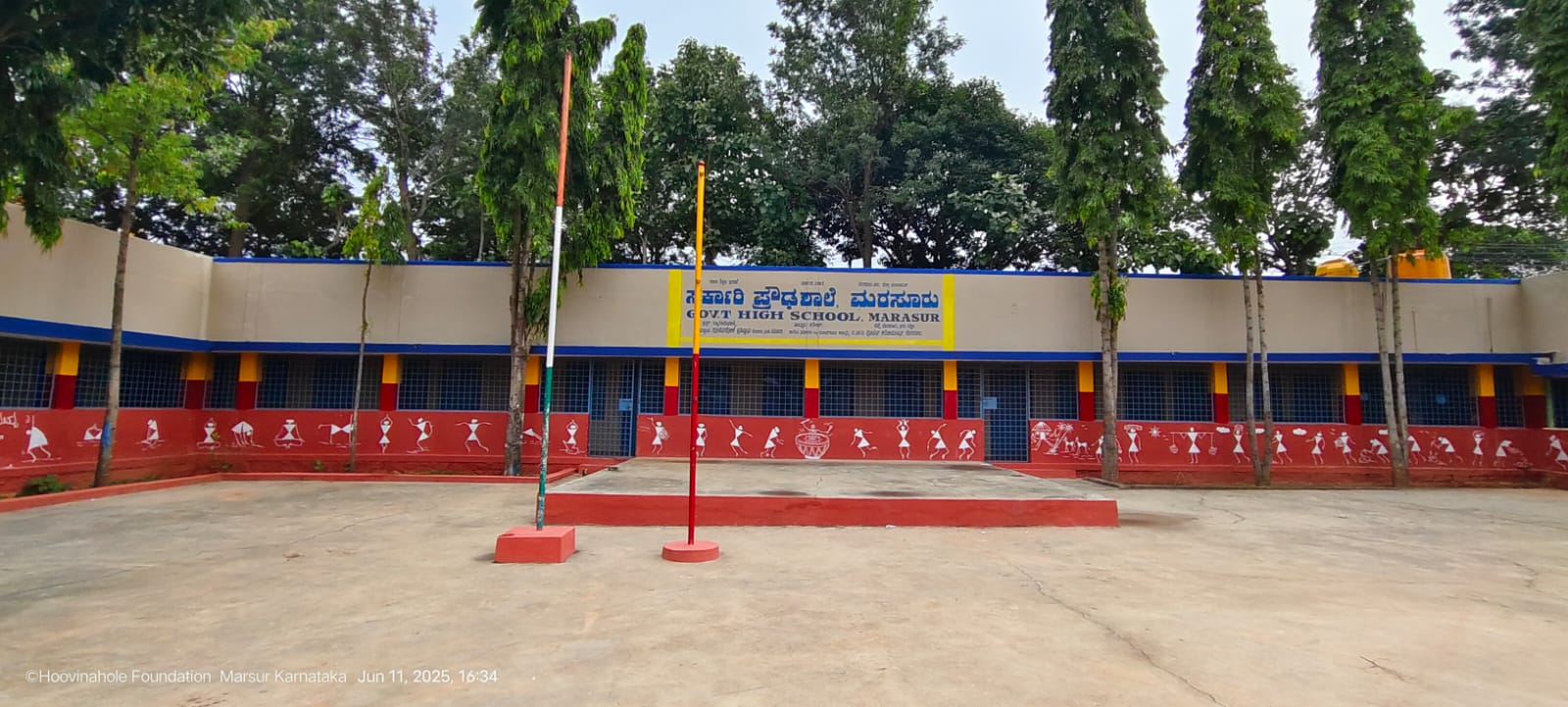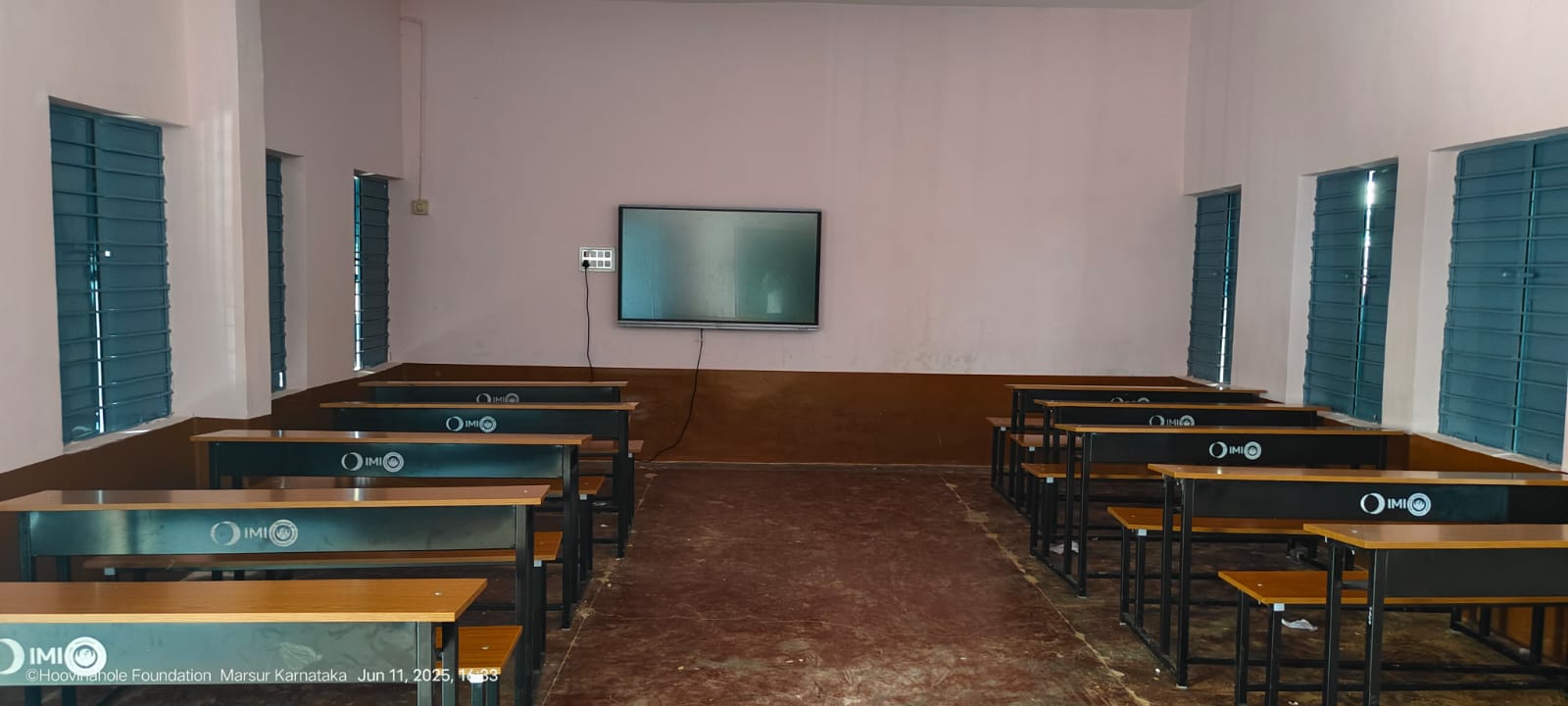At IIM Bangalore, education isn’t confined to the boundaries of classrooms and case studies. Spearheaded by Prof. Gopal Naik, Chairperson, Centre for Public Policy, Saksham brings together years of IIMB’s work in school development, launched during its Golden Jubilee celebrations in 2023. The vision of inclusive, grassroots change is now taking firm root, quite literally, in the villages and schools of Karnataka. Saksham, translated from Sanskrit, means “able.”
The Centre engages with the local Gram Panchayat, the Zila Panchayat, as well as the School Development Management Committee consisting of parents, teachers, and local leaders in earmarking funds for the development of the school. Through constant communication and raising awareness in the community, the Centre and its field staff use a nudge policy to enact development action from the local authorities. Through this, around 19 campuses have had compound walls built through the gram panchayat, and 3 more are under construction. Similarly, 13 new toilet blocks have been constructed by the gram panchayats, and 5 are under construction.
In the past year, CPP has also made meaningful strides in agriculture, drinking water, education, health, and employment across the blocks of Tiptur and Madhugiri in Tumkur, Belur Taluk in Hassan, and Anekal Taluk in Bengaluru Urban. But it’s not just about laying pipelines or donating computers; It’s about co-creating long-term, sustainable ecosystems of change.
Transformation That Touches Every Corner of a School
Across the regions, Saksham has been working closely with government schools to bring in essential resources, infrastructure, and engagement opportunities. From School Nutrition Gardens that supplement mid-day meals with fresh vegetables, to providing piped drinking water and proper sanitation, every intervention is made with purpose.
So far, the Centre has donated:
• 100 refurbished desktops and 20 refurbished laptops have been donated
• 9 almirahs have been donated to anganawadis for their use
• 2 modern toilet complexes (funded by the IIMB Alumni Batch of 1998)
• Digital Classrooms in collaboration with eVidyaloka and Gumbi Software
In Anekal’s Indlawadi Grama Panchayat, a Rural Computer Centre has been set up in partnership with ERIN Foundation, offering basic computer education not only to students but also to women through Self-Help Groups (SHGs). In total, Saksham has facilitated ₹1.2 crore worth of school transformation work with development partners, alumni, and local communities playing an integral role.
The interventions also stem from an extensive baseline survey across 56 schools in five adopted Gram Panchayats, which revealed critical gaps in infrastructure, availability of trained teachers, electricity, water supply, toilets, and labs. These deficiencies often discouraged parents from enrolling children in government schools, especially in places like Anekal and Mysore, where many facilities suffered from water leakage, inadequate sanitation, and broken infrastructure.
Green Student and Society Initiative
In early June 2025, Saksham, under the Centre of Public Policy, extended its commitment to environmental sustainability through a special project: the Green Student and Society Initiative, launched in partnership with the EMPRI (Environmental Management and Policy Research Institute) and the Government of Karnataka.
Over 1,000 students across 10 schools, members of their respective Eco Clubs, engaged in a thoughtful, action-oriented environmental program. Leading up to the plantation drive, students wrote essays, designed posters, and even crafted tree guards. They also held conversations with their teachers, families, and communities to identify meaningful spaces for planting fruit-bearing and shade-giving trees.
Saplings planted included: Wild Indian gooseberry, Wild almond, Mulberry, Neem, Hongamia, Rose apple, Java plum.
On the day of the event, each school became a hub of collective action, and students, parents, SDMC members, Forest Department officials, and Gram Panchayat representatives joined hands to plant over 80 saplings. The students also interacted with conservationists in an open Q&A session, making it a deeply experiential learning opportunity. Every student pledged to care for the plants year-round, transforming the saplings into symbols of responsibility and community stewardship.
Tackling Nutritional Deficiencies with School Gardens
One of the most innovative interventions under Saksham has been the School Nutrition Garden initiative. A study by IIMB’s UBA Cell revealed that standard mid-day meals in schools fell short of several key nutrients, including Vitamin A (5.5% of RDA), Riboflavin (26.5%), Folate (30.9%), and Calcium (42.1%). These deficiencies posed serious risks to the cognitive and physical development of students.
In collaboration with the Indian Institute of Horticulture Research (IIHR), Hesaraghatta, 17 schools established nutrition gardens using available land to grow vegetables such as spinach, tomatoes, and beans. These gardens now regularly supplement mid-day meals, while also serving as a vocational platform that builds students’ hands-on agricultural skills. Teachers have reported better student engagement and improved taste and satisfaction from the meals post-intervention.
Career Guidance and Capacity Building
Saksham’s commitment to holistic development extends to career readiness and teacher training. In 2024, over 50 teachers from schools in and around Bangalore and Mysore participated in a Train-the-Teacher workshop, learning how to integrate sustainability into their curriculum and empower students to lead community change.
Upcoming Initiatives
Saksham is more than an initiative; it’s a mindset. One that believes every child, regardless of geography, deserves access to quality education, clean drinking water, and a healthy, green school environment.
Through partnerships, hands-on programs, and an ever-growing network of stakeholders, Saksham continues to redefine what rural school development can look like.
At its heart, it is about nurturing ecosystems of care, curiosity, and change, one sapling, one school, one student at a time.
